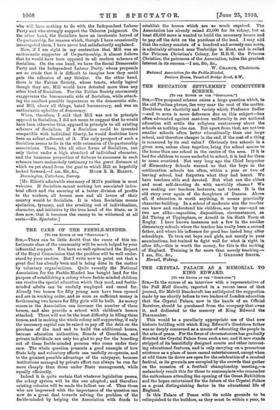Tar: EDUCATION SETTLEMENT COMMITTEE'S SCREAM.
[To TER EDITOR OF THY " SPECTATOR.°1
Sra,—The proposed scheme raises a large question which, in the old Puritan phrase, lies very near the root of the matter. Doubtless the elasticity and variety which Professor Sadler —and to none is more deference due on this subject—has often advocated against cast-iron uniformity in our national education will settle the religious controversy about the schools as nothing else can. But apart from that, are not two smaller schools often better educationally than one large school, and therefore cheaper in the end, if the cost of a thing is measured by its real value P Obviously two schools in a given area, unless close together, bring the school nearer to the home than one school in the centre of the area. If it is bad for children to come underfed to school, it is bad for them to come overtired. Not very long ago the Chief Inspector of Elementary Schools warned us that the boys in the continuation schools too often, within a year or two of leaving school, had forgotten what they had learnt. We have teachers able and devoted. But what can the ablest and most self-devoting do with unwieldy classes P We are making our teachers lecturers, not tutors. It is the old story over again of the daughters of Danaus. Above all, if education is worth anything, it means practically character-building. In a school of moderate size the teacher can know and understand his children, one by one—and no two are alike--capacities, dispositions, circumstances, as did Thring at Uppingham, or Arnold in his Sixth Form at Rugby. I have known instances not a few in the smaller elementary schools where the teacher has really been a second father, and where his influence for good has lasted long after schooldays. To turn out boys and girls, not merely to pass examinations, but trained to fight well for what is right in after life,—this is worth the money, for this is the making of England. Training is far more than merely teaching.—e






















































 Previous page
Previous page